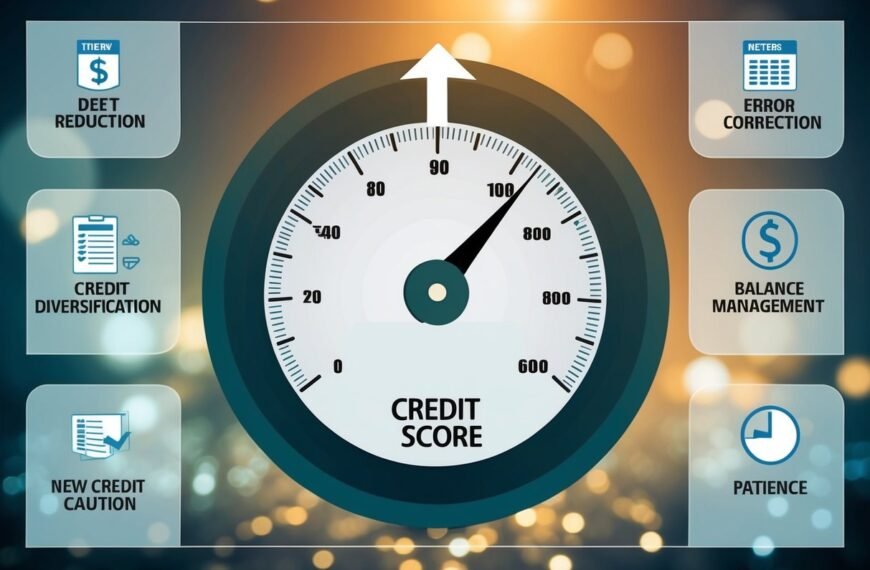
Explore the earlier installment of this series in Part 3-Steps to Monitor and Check Your Credit Score to build a comprehensive understanding before delving into this chapter.
In this chapter, you will discover the importance of having a strong credit history and how it impacts your financial transactions. The article is divided into five sections, each with valuable information and strategies for establishing, maintaining, and improving your credit history. From strategies for building credit from scratch to the benefits of being an authorized user, this article covers a wide range of topics to help you build a solid credit history. With a friendly and approachable tone, this article aims to provide you with the knowledge and tools needed to take control of your credit and achieve long-term financial success.
Establishing Credit History
The Challenge of No Credit History
When it comes to financial transactions, having a solid credit history is vital. However, if you are just starting your credit journey, you might find yourself faced with the challenge of having no credit history at all. This can make it difficult to apply for certain loans, rent an apartment, or even secure a new job.
Strategies for Building Credit from Scratch
Building credit from scratch might seem like a daunting task, but there are strategies you can employ to establish a positive credit history. One of the most effective ways is to start by opening a secured credit card. A secured credit card requires you to provide a cash deposit as collateral, which acts as your credit limit. By using the card responsibly and making timely payments, you can gradually build a positive credit history.
Responsible Use of a Secured Credit Card
Using a secured credit card responsibly is crucial in establishing your credit history. To ensure that you are using it properly, make sure to keep your credit utilization ratio low. This ratio measures the amount of credit you are using compared to your credit limit. Aim to keep your utilization ratio below 30% to demonstrate responsible credit usage.
On-Time Payments and Credit Scores
The Impact of Timely Payments on Credit Scores
One of the most significant factors that influence your credit score is your payment history. Timely payments have a positive impact on your credit score and can demonstrate to lenders that you are a responsible borrower. Late payments, on the other hand, can have a detrimental effect on your credit score. It is crucial to prioritize making your payments on time to maintain a good credit standing.
Setting Up Payment Reminders
To ensure that you never miss a payment deadline, setting up payment reminders can be incredibly helpful. You can use various methods to set up reminders, such as utilizing calendar alerts, setting up automatic payments, or even using mobile apps specifically designed for bill reminders. By establishing a system that works for you, you can stay on top of your payment schedule and avoid any potential negative impact on your credit score.
Budgeting for On-Time Payments
Maintaining a budget is an essential aspect of managing your finances effectively and making on-time payments. By carefully tracking your income and expenses, you can set aside the necessary funds to make your payments promptly. Take the time to review your monthly expenses and determine how much you can allocate towards debt repayment. This approach will help you avoid any financial strain and ensure that you can consistently make on-time payments.
Responsible Credit Utilization
Understanding Credit Utilization Ratio
Credit utilization ratio refers to the percentage of your available credit that you are currently using. It is an important metric used by credit bureaus to evaluate your creditworthiness. To calculate your credit utilization ratio, divide your total credit card balance by your total credit limit and multiply the result by 100. For example, if your total credit card balance is $500 and your credit limit is $2,000, your credit utilization ratio would be 25%. A lower credit utilization ratio indicates responsible credit management and can positively impact your credit score.
Strategies for Maintaining Low Credit Card Balances
To maintain a low credit utilization ratio, it is important to actively manage your credit card balances. Avoid carrying high balances on your credit cards, as this can negatively impact your credit score. Aim to pay off your balance in full each month if possible, or at least make more than the minimum payment. By keeping your credit card balances in check, you are demonstrating responsible credit utilization, which can improve your overall credit profile.
Avoiding Maxed-Out Credit Cards
Maxing out your credit cards is something you should strive to avoid. It not only puts you at risk of going over your credit limit but also sends a negative signal to lenders as it indicates a higher credit utilization ratio. Keep a close eye on your credit card balances and make sure to stay well below your credit limit. By avoiding maxed-out credit cards, you demonstrate responsible financial management and improve your creditworthiness.
Types of Credit and Length of Credit History
The Role of Different Types of Credit (Revolving, Installment)
Having a diverse range of credit accounts can positively impact your credit history. There are two main types of credit accounts: revolving credit and installment credit. Revolving credit, such as credit cards, allows you to borrow up to a certain limit and make consistent monthly payments. Installment credit, on the other hand, involves borrowing a fixed amount and repaying it with regular, scheduled payments over a set period of time. Having both types of credit accounts and responsibly managing them shows lenders that you can handle different forms of credit.
The Benefits of a Longer Credit History
The length of your credit history is another important factor that lenders consider when evaluating your creditworthiness. A longer credit history provides a more comprehensive view of your financial behavior and payment patterns. It demonstrates your ability to manage credit over an extended period of time. By maintaining a positive credit history over many years, you are more likely to have a higher credit score and gain access to better loan terms.
Managing Old Accounts to Preserve Length
To preserve the length of your credit history, it is important to manage old accounts responsibly. Closing old accounts can shorten the average age of your credit history and potentially impact your credit score. Instead of closing old accounts, consider keeping them open and occasionally making small purchases to ensure they remain active. However, be cautious and only keep accounts open that are in good standing and do not have high annual fees or unnecessary expenses.

Being an Authorized User
How Becoming an Authorized User Can Benefit Credit History
Becoming an authorized user on someone else’s credit card can be a beneficial strategy to improve your credit history. When you are added as an authorized user, the account’s payment history and credit utilization are often reported on your credit report. If the primary account holder has a long history of making on-time payments and maintains low credit card balances, it can positively impact your credit history as well.
Finding Trusted Account Holders
When considering becoming an authorized user, it is essential to find trusted account holders. You should choose someone who you trust to make timely payments and maintain responsible credit utilization. By selecting a trustworthy account holder, you can ensure that their positive financial habits are reflected in your credit history.
Potential Risks and Considerations
While becoming an authorized user can potentially benefit your credit history, there are some risks and considerations to keep in mind. If the primary account holder starts making late payments or carries high credit card balances, it can negatively impact your credit history. Additionally, if you apply for credit in the future, lenders may take into account the fact that you are an authorized user on someone else’s account, potentially affecting their decision.
Conclusion
Recap of Key Strategies for Building a Solid Credit History
Building a solid credit history is crucial for financial success. By following specific strategies, you can establish and maintain a positive credit history. These strategies include starting with a secured credit card, making on-time payments, responsibly utilizing credit, diversifying credit types, and leveraging trusted account holders.
The Long-Term Benefits of a Strong Credit History
Having a strong credit history opens up numerous financial opportunities. It allows you to qualify for better loan terms, secure lower interest rates, and gain access to higher credit limits. A solid credit history is an invaluable asset in your financial journey and can provide stability and peace of mind.
Teaser for Upcoming Blogs in the Series
In the upcoming blogs in this series, we will delve deeper into specific topics related to credit history. We will explore the impact of credit inquiries, the process of disputing errors on your credit report, and the importance of regularly monitoring your credit. Stay tuned for more valuable insights and tips to help you navigate the world of credit!
Discover more in Part 5-Dealing with Credit Issues and Negative Marks.








